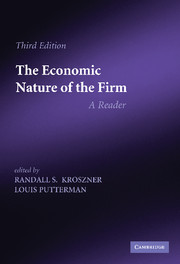Book contents
- Frontmatter
- Contents
- Editors' preface
- Reintroducing The Economic Nature of the Firm
- Part I Within and among firms: the division of labor
- Part II The scope of the firm
- Part III The employment relation, the human factor, and internal organization
- 13 Production, information costs, and economic organization
- 14 Contested exchange: new microfoundations for the political economy of capitalism
- 15 Understanding the employment relation: the analysis of idiosyncratic exchange
- 16 Multitask principal–agent analyses: incentive contracts, asset ownership, and job design
- 17 Work motivation
- 18 Worker participation
- Part IV Finance and the control of the firm
- References
- References
17 - Work motivation
Published online by Cambridge University Press: 05 June 2014
- Frontmatter
- Contents
- Editors' preface
- Reintroducing The Economic Nature of the Firm
- Part I Within and among firms: the division of labor
- Part II The scope of the firm
- Part III The employment relation, the human factor, and internal organization
- 13 Production, information costs, and economic organization
- 14 Contested exchange: new microfoundations for the political economy of capitalism
- 15 Understanding the employment relation: the analysis of idiosyncratic exchange
- 16 Multitask principal–agent analyses: incentive contracts, asset ownership, and job design
- 17 Work motivation
- 18 Worker participation
- Part IV Finance and the control of the firm
- References
- References
Summary
During 1992 and 1993, I undertook a field study in the Northeast of the United States to learn why wages and salaries seldom fall during recessions. I interviewed more than 330 business people, labor leaders, counselors of unemployed workers, labor market intermediaries (headhunters), labor lawyers, and management consultants. The purpose of the study was exploratory; much of my effort went into the search for hypotheses rather than tests of specific ones. For this reason, I did not require informants to answer a fixed list of questions, but informed them of the purpose of the study and invited them to tell me what they thought was relevant. I intervened only occasionally to seek clarification, show interest, or nudge the discussion in new directions.
Only after informants had spoken at length did I ask specific questions to cover points that interested me. I usually avoided asking about economic theories until the end of interviews. Such questions sometimes stopped conversation, because the theories seemed naive and the questions led respondents to try to think like an economist, rather than to explain their world concretely in their own terms. Some business people refused such open-ended interviews, probably because they feared that while talking loosely they might say something that would embarrass them or hurt their company. I concluded that low response rates might make a random sample unrepresentative. (I had much less difficulty gaining the cooperation of the other types of respondents.
- Type
- Chapter
- Information
- The Economic Nature of the FirmA Reader, pp. 245 - 252Publisher: Cambridge University PressPrint publication year: 2009



